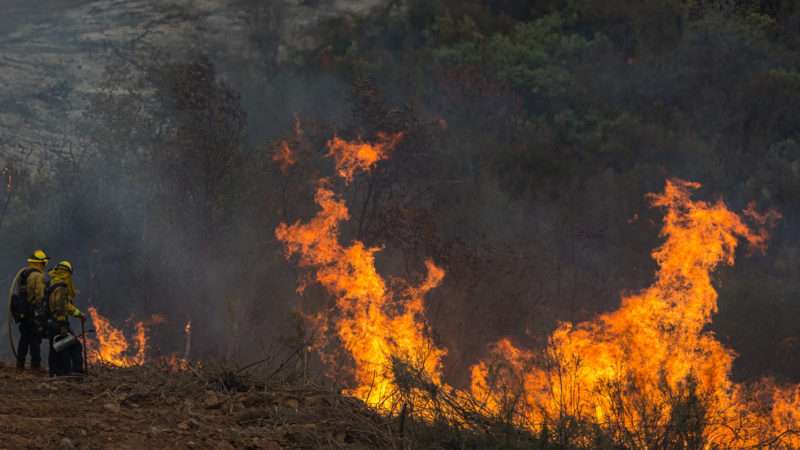
A few years ago, I blithely drove toward the Humboldt redwood forests across the coastal ranges without checking the morning road updates. Let’s just say that moving along in a small metal box with fires raging on both sides of Highway 20 gives one a new appreciation of the perilous work firefighters do to contain such blazes.
As another grueling fire season grips California, I understand growing concerns about a widely reported lack of firefighting resources. Although structure fires and, especially, paramedic calls comprise the bulk of calls to local fire departments, there’s no question that arid California needs a boisterous system for battling blazes in its expansive forests. Wildfires are as predictable as the rising sun, but the state doesn’t do a great job preparing for them.
“More than 930,000 acres have burned so far in Northern and Central California—an area larger than the land mass of Rhode Island—with little containment, in part because firefighting resources are stretched beyond capacity by the number of blazes,” according to a report last week in the Los Angeles Times. The Ocean State would barely make a decent-sized county here, but that’s still an incredible amount of tinder.
The article noted that California officials have had to make “tough choices on which (wildfires) to fight” and that “officials said they were being turned down for state help and left to beg equipment and manpower from volunteers and local agencies.” State officials have little choice but to allow some amazing forestlands, including redwood groves, to burn to the ground.
Most of the ongoing debates about firefighting center on broader environmental and regulatory issues. Predictably, climate-change activists blame global warming. “Temperatures rose about 1.8 degrees Fahrenheit statewide while precipitation dropped 30 percent since 1980,” according to a Scientific American article in April about a Stanford University study. Researchers blame this heat rise for an increase in the days in which fire risk is at the highest.
Others blame California’s forest-management policies. “It’s not climate change that’s burning up the forests, killing people, and destroying hundreds of homes; it’s decades of environmental mismanagement that has created a tinderbox of unharvested timber, dead trees, and thick underbrush,” argued former Orange County Assemblyman Chuck Devore in Forbes last year.
Still others say the state’s heavily regulated insurance system, which limits the ability of insurers to price fire policies at the market rate, subsidizes home construction in heavily wooded areas. There also are myriad disputes relating to electrical lines, and the liability laws that govern responsibility when those lines spark a wildfire. I’m more focused on a nuts-and-bolts governance problem—one that is standard fare with all government services.
Because agencies are monopoly institutions, funded by tax proceeds and mandatory fees, they do a terrible job allocating the resources that they receive. In the private sector, companies that do a lousy job go out of business. In the public sector, agencies that perform poorly or inadequately lobby for more money—so they continue with business as usual.
Frankly, union power drives state and local firefighting policies. The median compensation package for firefighters has topped $240,000 a year in some locales. California Department of Forestry and Fire Protection firefighters earn less, but their packages still total nearly $150,000 a year. The number of California firefighters who receive compensation packages above $500,000 a year is mind-blowing.
Obviously, if the state spends scarce resources in this manner, it will have fewer resources to hire additional firefighters and buy equipment that’s now in short supply. After one particularly bad fire season, an acquaintance told me that we should pay firefighters “anything.” The state has indeed taken that approach, and look where it’s gotten us. Meanwhile, 70 percent of the nation’s firefighters, including in the town where I live, do this tough work on a volunteer basis.
Any politician who tries to improve how firefighting services are provided, or to help communities get their raging compensation costs under control, runs up against a special-interest juggernaut that’s as challenging as a three-alarm office fire. For instance, this newspaper group has detailed the outrageous pushback that Placentia faced from chiefs and unions as it created a new department to provide better and less costly services for residents.
Opponents cited safety concerns, but opposition was really about compensation given that Placentia’s model offers a cost-saving—but generous—retirement plan and outsources paramedic services to a private company. Even as legislators bemoan the current resource problems, they recently supported, on a bipartisan basis, a union-backed pension bill (Assembly Bill 2967) that effectively prohibits other cities from following Placentia’s approach.
We all appreciate the work that firefighters do, especially during another grueling fire season, but we shouldn’t forget that firefighting resource shortages are caused by a legislature that is more interested in preserving union wage levels than in creating a firefighting system that works best for the public.
This column was first published in the Orange County Register.
from Latest – Reason.com https://ift.tt/33cfFTJ
via IFTTT